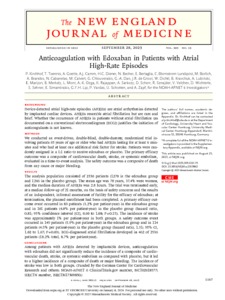Kirchhof, P;
Toennis, T;
Goette, A;
Camm, AJ;
Diener, HC;
Becher, N;
Bertaglia, E;
Blomstrom Lundqvist, C;
Borlich, M;
Brandes, A;
et al.
Kirchhof, P; Toennis, T; Goette, A; Camm, AJ; Diener, HC; Becher, N; Bertaglia, E; Blomstrom Lundqvist, C; Borlich, M; Brandes, A; Cabanelas, N; Calvert, M; Chlouverakis, G; Dan, G-A; de Groot, JR; Dichtl, W; Kravchuk, B; Lubiński, A; Marijon, E; Merkely, B; Mont, L; Ozga, A-K; Rajappan, K; Sarkozy, A; Scherr, D; Sznajder, R; Velchev, V; Wichterle, D; Sehner, S; Simantirakis, E; Lip, GYH; Vardas, P; Schotten, U; Zapf, A; NOAH-AFNET 6 Investigators
(2023)
Anticoagulation with Edoxaban in Patients with Atrial High-Rate Episodes.
N Engl J Med, 389 (13).
pp. 1167-1179.
ISSN 1533-4406
https://doi.org/10.1056/NEJMoa2303062
SGUL Authors: Camm, Alan John
![[img]](https://openaccess.sgul.ac.uk/115970/1.hassmallThumbnailVersion/nejmoa2303062.pdf)  Preview |
|
PDF
Published Version
Available under License ["licenses_description_publisher" not defined].
Download (648kB)
| Preview
|
Abstract
BACKGROUND: Device-detected atrial high-rate episodes (AHREs) are atrial arrhythmias detected by implanted cardiac devices. AHREs resemble atrial fibrillation but are rare and brief. Whether the occurrence of AHREs in patients without atrial fibrillation (as documented on a conventional electrocardiogram [ECG]) justifies the initiation of anticoagulants is not known. METHODS: We conducted an event-driven, double-blind, double-dummy, randomized trial involving patients 65 years of age or older who had AHREs lasting for at least 6 minutes and who had at least one additional risk factor for stroke. Patients were randomly assigned in a 1:1 ratio to receive edoxaban or placebo. The primary efficacy outcome was a composite of cardiovascular death, stroke, or systemic embolism, evaluated in a time-to-event analysis. The safety outcome was a composite of death from any cause or major bleeding. RESULTS: The analysis population consisted of 2536 patients (1270 in the edoxaban group and 1266 in the placebo group). The mean age was 78 years, 37.4% were women, and the median duration of AHREs was 2.8 hours. The trial was terminated early, at a median follow-up of 21 months, on the basis of safety concerns and the results of an independent, informal assessment of futility for the efficacy of edoxaban; at termination, the planned enrollment had been completed. A primary efficacy outcome event occurred in 83 patients (3.2% per patient-year) in the edoxaban group and in 101 patients (4.0% per patient-year) in the placebo group (hazard ratio, 0.81; 95% confidence interval [CI], 0.60 to 1.08; P = 0.15). The incidence of stroke was approximately 1% per patient-year in both groups. A safety outcome event occurred in 149 patients (5.9% per patient-year) in the edoxaban group and in 114 patients (4.5% per patient-year) in the placebo group (hazard ratio, 1.31; 95% CI, 1.02 to 1.67; P = 0.03). ECG-diagnosed atrial fibrillation developed in 462 of 2536 patients (18.2% total, 8.7% per patient-year). CONCLUSIONS: Among patients with AHREs detected by implantable devices, anticoagulation with edoxaban did not significantly reduce the incidence of a composite of cardiovascular death, stroke, or systemic embolism as compared with placebo, but it led to a higher incidence of a composite of death or major bleeding. The incidence of stroke was low in both groups. (Funded by the German Center for Cardiovascular Research and others; NOAH-AFNET 6 ClinicalTrials.gov number, NCT02618577; ISRCTN number, ISRCTN17309850.).
| Item Type: |
Article
|
| Additional Information: |
From New England Journal of Medicine, Kirchhof, P; Toennis, T; Goette, A; Camm, AJ; Diener, HC; Becher, N; Bertaglia, E; Blomstrom Lundqvist, C; Borlich, M; Brandes, A; et al., Anticoagulation with Edoxaban in Patients with Atrial High-Rate Episodes, Volume No. 389, Page No. 1167-1179 Copyright © 2023 Massachusetts Medical Society. Reprinted with permission. |
| Keywords: |
Aged, Female, Humans, Male, Anticoagulants, Atrial Fibrillation, Embolism, Factor Xa Inhibitors, Hemorrhage, Stroke, Electrodes, Implanted, Double-Blind Method, Arrhythmias, Cardiac, Risk Factors, NOAH-AFNET 6 Investigators, Humans, Atrial Fibrillation, Embolism, Hemorrhage, Anticoagulants, Risk Factors, Double-Blind Method, Electrodes, Implanted, Aged, Female, Male, Arrhythmias, Cardiac, Stroke, Factor Xa Inhibitors, 11 Medical and Health Sciences, General & Internal Medicine |
| SGUL Research Institute / Research Centre: |
Academic Structure > Molecular and Clinical Sciences Research Institute (MCS) |
| Journal or Publication Title: |
N Engl J Med |
| ISSN: |
1533-4406 |
| Language: |
eng |
| Publisher License: |
Publisher's own licence |
| Projects: |
| Project ID | Funder | Funder ID |
|---|
| PG/17/30/32961 | British Heart Foundation | http://dx.doi.org/10.13039/501100000274 | | FKZ 81X2800182 | German Center for Cardiovascular Research | UNSPECIFIED | | 633196 | European Union | UNSPECIFIED | | 847770 | European Union | UNSPECIFIED | | 965286 | European Union | UNSPECIFIED | | AA/18/2/34218 | British Heart Foundation | http://dx.doi.org/10.13039/501100000274 | | Ki 509167694 | German Research Foundation | UNSPECIFIED | | 81Z0710116 | German Center for Cardiovascular Research | UNSPECIFIED | | 81Z0710110 | German Center for Cardiovascular Research | UNSPECIFIED |
|
| PubMed ID: |
37622677 |
| Dates: |
| Date |
Event |
| 2023-09-28 |
Published |
|
 |
Go to PubMed abstract |
| URI: |
https://openaccess.sgul.ac.uk/id/eprint/115970 |
| Publisher's version: |
https://doi.org/10.1056/NEJMoa2303062 |
Statistics
Item downloaded times since 08 Jan 2024.
Actions (login required)
 |
Edit Item |



